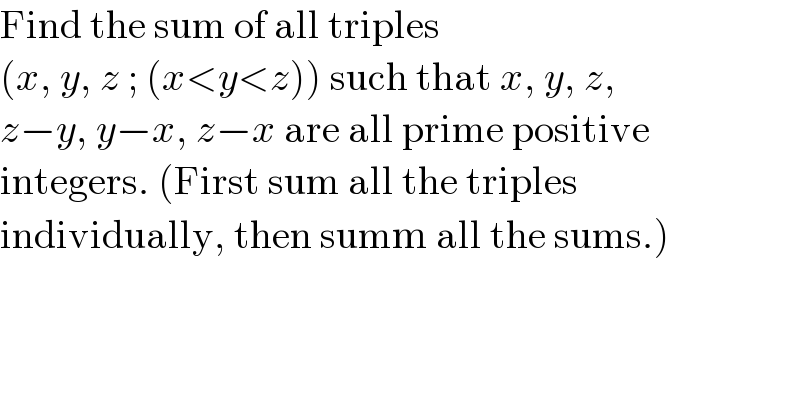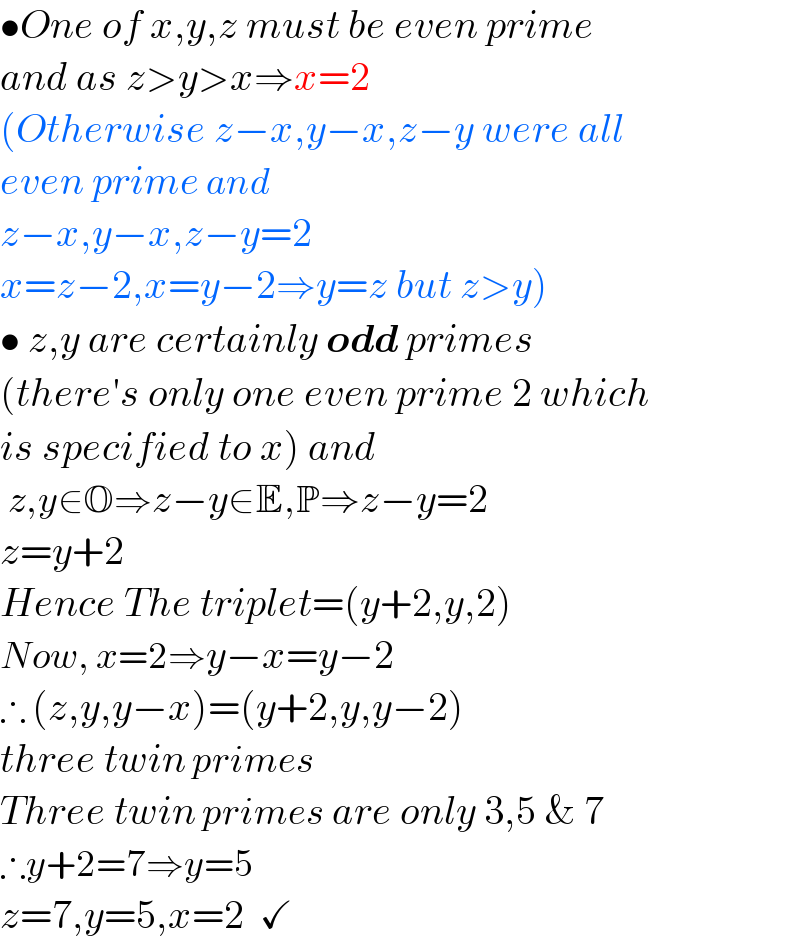Question Number 160141 by abdullah_ff last updated on 25/Nov/21

$$\mathrm{Find}\:\mathrm{the}\:\mathrm{sum}\:\mathrm{of}\:\mathrm{all}\:\mathrm{triples} \\ $$$$\left({x},\:{y},\:{z}\:;\:\left({x}<{y}<{z}\right)\right)\:\mathrm{such}\:\mathrm{that}\:{x},\:{y},\:{z}, \\ $$$${z}−{y},\:{y}−{x},\:{z}−{x}\:\mathrm{are}\:\mathrm{all}\:\mathrm{prime}\:\mathrm{positive} \\ $$$$\mathrm{integers}.\:\left(\mathrm{First}\:\mathrm{sum}\:\mathrm{all}\:\mathrm{the}\:\mathrm{triples}\right. \\ $$$$\left.\mathrm{individually},\:\mathrm{then}\:\mathrm{summ}\:\mathrm{all}\:\mathrm{the}\:\mathrm{sums}.\right) \\ $$
Answered by Rasheed.Sindhi last updated on 25/Nov/21

$$\bullet{One}\:{of}\:{x},{y},{z}\:{must}\:{be}\:{even}\:{prime} \\ $$$${and}\:{as}\:{z}>{y}>{x}\Rightarrow{x}=\mathrm{2} \\ $$$$\left({Otherwise}\:{z}−{x},{y}−{x},{z}−{y}\:{were}\:{all}\right. \\ $$$${even}\:{prime}\:{and} \\ $$$${z}−{x},{y}−{x},{z}−{y}=\mathrm{2} \\ $$$$\left.{x}={z}−\mathrm{2},{x}={y}−\mathrm{2}\Rightarrow{y}={z}\:{but}\:{z}>{y}\right) \\ $$$$\bullet\:{z},{y}\:{are}\:{certainly}\:\boldsymbol{{odd}}\:{primes}\: \\ $$$$\left({there}'{s}\:{only}\:{one}\:{even}\:{prime}\:\mathrm{2}\:{which}\right. \\ $$$$\left.{is}\:{specified}\:{to}\:{x}\right)\:{and} \\ $$$$\:{z},{y}\in\mathbb{O}\Rightarrow{z}−{y}\in\mathbb{E},\mathbb{P}\Rightarrow{z}−{y}=\mathrm{2} \\ $$$${z}={y}+\mathrm{2} \\ $$$${Hence}\:{The}\:{triplet}=\left({y}+\mathrm{2},{y},\mathrm{2}\right) \\ $$$${Now},\:{x}=\mathrm{2}\Rightarrow{y}−{x}={y}−\mathrm{2} \\ $$$$\therefore\:\left({z},{y},{y}−{x}\right)=\left({y}+\mathrm{2},{y},{y}−\mathrm{2}\right) \\ $$$${three}\:{twin}\:{primes}\: \\ $$$${Three}\:{twin}\:{primes}\:{are}\:{only}\:\mathrm{3},\mathrm{5}\:\&\:\mathrm{7} \\ $$$$\therefore{y}+\mathrm{2}=\mathrm{7}\Rightarrow{y}=\mathrm{5} \\ $$$${z}=\mathrm{7},{y}=\mathrm{5},{x}=\mathrm{2}\:\:\checkmark \\ $$
Commented by abdullah_ff last updated on 25/Nov/21

$$\mathfrak{G}\mathrm{ood}\:\mathcal{W}\mathrm{ay}\:\mathscr{M}\mathrm{y}\:\mathbb{D}\mathrm{ear}\:{S}\mathrm{ir} \\ $$
